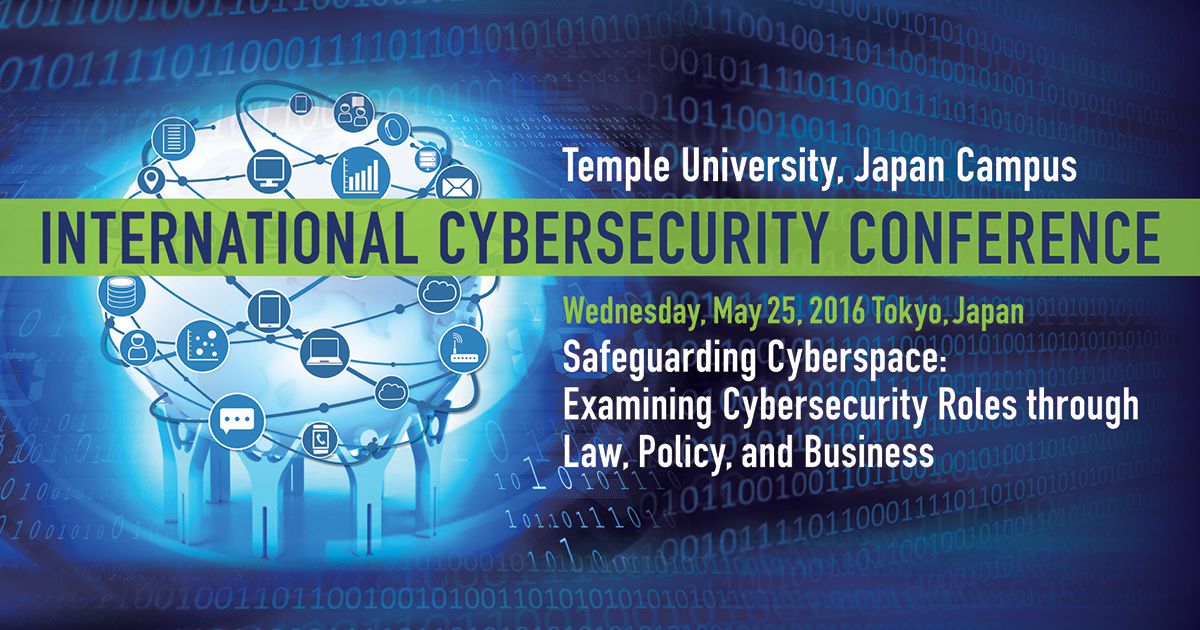
The Beasley School of Law at Temple University, Japan Campus (TUJ) will present an afternoon of interesting talks and panel discussions with industry leaders in business, government, and law focusing on the issue of allocating responsibility for cybersecurity.
For any questions about the conference, contact tujlaw@tuj.temple.edu / 03-5441-9841.
- Date:
- Wednesday, May 25, 2016
- Time:
- 11:30-18:30
- Venue:
- Grand Prince Hotel New Takanawa, Tokyo, Japan (Access)
- Capacity:
- 150
- Cost:
- 9,000 yen for advance payment by bank transfer (by Friday, May 20)
10,000 yen by cash at the door - Registration:
- For details, and to register visit the conference website.
International Cybersecurity Conference
Notes: The conference will be held in English and open to the public.
Overview
Cybersecurity is at the forefront of issues deeply affecting both public and private sectors. Combating the pervasive threat of cyberattacks remains a top priority for regulators, policymakers, companies, and the information and communication technology (ICT) industry. Increasingly, however, we see rising tensions between public and private interests in the struggle to define the roles of governments and businesses in cyber risk management. A critical question is how to allocate responsibility for cybersecurity across all sectors.
The Beasley School of Law at Temple University, Japan Campus will explore this issue through a one-day conference on cybersecurity. The goal of the conference is to examine sources of tension over who bears responsibility for cybersecurity issues and the relative tradeoffs in pursuing different responsive models, including domestic lawmaking, international norms, industry standards, and technical cooperation. More broadly, the conference will offer a forum for open dialogue among policymakers, academics and industry stakeholders to explore the global community’s challenges in handling cybersecurity from a risk management approach. Incorporating multidisciplinary and international points of view, this event will inform and stimulate further thinking by participants in addressing the accountability question for cybersecurity from legal, policy, and corporate perspectives.
Speakers include
- Sean Kanuck
National Intelligence Officer for Cyber Issues, Office of the Director of National Intelligence - Duncan B. Hollis
James E. Beasley Professor of Law and Associate Dean for Academic Affairs, Temple University School of Law - William Saito
Special Advisor, Cabinet Office, Government of Japan - Ann Barron-DiCamillo
Former Director USCERT and Chief Technology Officer, Strategic Cyber Ventures - Scott Bower
Executive Officer, Deloitte Touche Tohmatsu LLC - Angela McKay
Director, Cybersecurity Policy and Strategy, Microsoft - Kaja Ciglic
Senior Cybersecurity Strategist, Microsoft - Ryuichi Hirano
Chief of International Strategy Group, National Information Security Center, Japan Government Cabinet Secretariat - Scott Jarkoff
Senior Security Adviser, Intel Security and Former DOD Chief of Cyber Security US Japan Forces - John Kirch
Director, North Asia, Darktrace - Mihoko Matsubara
Chief Security Officer for Japan, Palo Alto Networks - Kenneth Reilly
Executive Corporate Officer, Commercial Division, AIG Japan Holdings KK - Riley Repko
Managing Director, Defense & Security Cisco Systems, Japan - Harvey Rishikof
Senior Counsel, Crowell and Moring - Shelagh Sayers
US Embassy Legal Attaché (FBI) - Louise Stoupe
Partner, Morrison & Foerster
Speaker list to be updated.
Beasley School of Law at Temple University, Japan Campus
Based in Philadelphia, Pennsylvania, the main campus law school, founded in 1895 and accredited by the American Bar Association (ABA), educates about 1,000 Juris Doctor (J.D.) students and 150 Masters of Law (LL.M.) students annually. At its Tokyo campus, Temple University Beasley School of Law operates a year-round program in which students can earn LL.M. degrees and certificates without ever leaving Japan. All courses are taught in English, usually on weekday evenings and occasionally on weekends.

